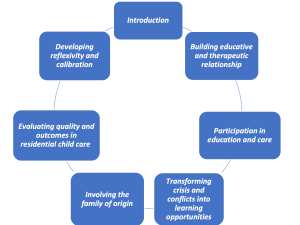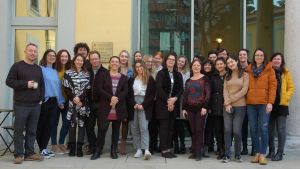NEWSLETTER 2
ERCCI is an Erasmus+ project (2018-2021) developed by a consortium of five European Universities from Finland, Germany, Lithuania, Italy and Spain. The main goal of this project is to promote professionalization and adequate training model for practitioners of residential child care in Europe.
Empowering residential care by interprofessional training
The rationale for ERCCI project is the need for a model of professional intervention in residential child care. Despite the high vulnerable profiles of children and young people in residential care and the demanding and challenging type of work required in these services, there is a lack of clear professional profile and training when comparing the situation from an international perspective. Different names and different levels of qualification can be appreciated when comparing residential child care not just in Europe but also in other countries.
The main objective of the ERCCI project is to produce a training course model capable of gathering the basic and necessary competencies to develop professional work in residential care. Regardless of the name that these professionals have in each country, the tasks to be carried out and the needs of the young people to be covered are very similar. Consequently, the ERCCI project has developed a training course gathering the main theoretical and practical aspects that research in this field has identified as fundamental.
A previous step: mapping residential child care
As a previous objective of the ERCCI project, we have carried out an international research among our partner countries to compare the situation of residential child care in the context of the child welfare system. We have collected a systematic review of indicators, figures and characteristics in each country in order to be able to compare the situation of out-of-home care services, comparing residential and family foster care, as well as the profile of children and young people in residential care, staff qualification, salaries, etc., This mapping is now to be submitted for publication in a scientific journal and preliminary results were already presented in international conferences.
Training by MOOC course
As a way to facilitate access to all professionals and students interested in this field, the ERCCI project has developed its training proposal in the form of a MOOC course. This type of course allows easy and open access to a wide range of audiences through an online platform.
The structure of our MOOC course is designed in six modules, including a previous introduction

Current status of ERCCI project
At this moment the ERCCI team is completing the content of each module and piloting the presentations and activities with a group of students in each of the partner countries. Each Module is divided in 5-6 units, including videos, lessons and practical activities, as well as proposals for reflection and evaluation about the contents. After this piloting activity, the ERCCI MOOC course will be available at the end of 2021 and we will disseminate the access to our online platform by different means and social media.
As a European project the ERCCI MOOC is produced in English but some of the partner countries will prepare a future own language version.

The ERCCI Project is developed by a large team that combines the experience of researchers, professors and professionals, as well as students who provide the perspective of future users of the MOOC course. Students participate in the development of materials in different countries and through piloting help to evaluate the contents and materials that make up the training.
Follow us to be updated with the project activities, products and results:
![]() Link to our Twitter https://twitter.com/ERCCIproject?s=17
Link to our Twitter https://twitter.com/ERCCIproject?s=17
![]() Link to our Instagram https://www.instagram.com/ercci.project/
Link to our Instagram https://www.instagram.com/ercci.project/
NEWSLETTER 1
Professionalization in residential child care
Residential care is a measure that remains as necessary in the child protection systems in Europe. Although family foster care is always a priority measure, the demand for residential care is growing due to the increase in profiles of adolescents with serious behaviour problems difficult to be placed in family foster care. As a consequence, residential care is becoming a specialized service for the most severely damaged adolescents.
Intervening in the residential setting with these adolescents with complex needs requires adequate training for professionals. However, there is no professional model for staff working in residential care in Europe, nor a common or agreed educational curriculum.
The specific objectives of the ERCCI project are:
1) To elaborate what and how residential child care as an intervention and future Residential Child Care (RCC) workers need for integrated training are in focus in the partner countries.
2) To develop an understanding of qualification requirements for the RCC workforce that shares common values and respects the diversity of possible approaches to realize the across Europe.
3) To design collaboratively a study module which meets the needs of the partners and future challenges of RCC training and testing it with teachers, students and stakeholders.
4) To enable the exploitation of produced deliverables into the other European countries and realize them in training educational levels in bachelor and masters HEI training as well as workplace base training.
Our ERCCI expected results are:
1) Report on RCC intervention: competences and practices in Europe, producing a summary of current evidence about actualk competence profiles for th RCC workers in partner countries and across Europe.
2) Competence based study module for bachelor, master’s and workplace training level. To guarantee wide access for learners of different age, profile and expertise and needs, ERCCI will develop a multiple tool combining a MOOC (massive Open Online Course) with open badges as certification.
3) ERCCI platform containing “Innopeda Learning” approach with study module and the usage of eLearning pedagogy. The detailed description of the study content in three level will be emerged into ERCCI Platform: objectives, structure of the studies, reflective e-learning, competencies, study material and eLearning pedagogy.

Collaborative and participative methodology
A pedagogy of innovation is applied, entailing four critical student interactions: with content, teacher, other students and themselves (reflective and reflexive work).
Three teaching/training/learning events will take place in Vilnius (Lithuania), Milan (Italy) and Kessel (Germany) from 2018 to 2020.
The first meeting took place in Vilnius hosted by the University Mikolo Romerio University. Partners presented a description of the practice and characteristics of residential child care in their countries as a first step to make a report on the RCC intervention in Europe. This “mapping” will be complemented with empirical research in each country by means of interviews and focus groups with different stakeholders.
As a second main task, students and teachers worked together in a first approach to key contents and competencies for ERCCI study model.
Stakeholders involvement and dissemination
Stakeholders (RCC staff, managers, policymakers, researchers, students, etc.,) are a crucial part of the dissemination strategies of ERCCI project. In order to engage them in our project two multiplier events are designed. The first one was held in spring 2019 in all country partners, where groups of 1-30 stakeholders were attending a one-day session of presentations and debates about RCC tr aining and staff needs.
aining and staff needs.
Multiplier event at University of Oviedo (Spain). More than 20 practitioners, directors of RCC agencies and representatives of the
